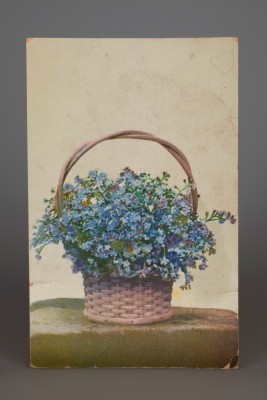Stromness Museum cares for a large collection of objects from the German Fleet: from spanners, to binoculars, bells to propellors. Sometimes with these hard metal objects it can be difficult to connect with ordinary sailors who were interned in Scapa Flow for those long seven months. However, the collection does contain two postcards, written by loved ones in Germany, to sailors on the Fleet. The postcards give us a small glimpse into the lives of the people who wrote and received them, illuminating their thoughts, experiences and insecurities.
The postcards are written in an old German handwriting style called ‘Kurrent’. It is quite difficult to decipher, as some of the alphabet looks totally different to modern German writing. With the help of a German volunteer, we received transcriptions of the postcard texts. I have translated them into English:
Firstly, let’s look at the postcard from ‘Lenchen’ to Walter. It’s written in Dresden in July 1918.


GERMAN:
Dresden d.12.7.18
Lieber Walter
Deine zwei lieben Briefe habe ich mit großer Freude erhalten. Habe herzlichen Dank dafür.
Wo ist es den schöner, bei Lanzer oder bei Muttern? Ich glaube doch sicher, das letztere.
Hoffentlich hält die gute Stimmung, die deinen Schilderungen nach bei euch herrscht an.
Meinen Verprechungen nachkommend, sende ich Dir ein Bild von mir. Hoffentlich gefalle ich Dir ein wenig, wenn nicht, so kannst du es ja zerreißen.
Sei herzlich gegrüßt von Deiner Freundin Lenchen. Schriebe bitte wieder!
Viele Grüße von Ida, kommst du Sonntag auf Urlaub??
ENGLISH:
Dresden d.12.7.18
Dear Walter
I was really happy to get your two lovely letters. I’m really grateful for them.
Where is nicer then? In the military or with mother? I think the latter, for sure.
Hopefully the good mood from your description still prevails.
Just as I promised, I'm sending you a picture of me. Hopefully you like me a bit. If not, just rip it up.
Lots of love from your girlfriend Lenchen. Write again please
Many greetings from Ida, do you get holidays on Sunday??
(this is written as a post script up the side)
What struck me reading this postcard, is that ‘Lenchen’ sends a photo of herself and wonders whether it will be received with approval. This bears resemblance to our modern social media culture and the practice of posting pictures and seeking ‘likes’ in approval. In a hundred years, that at least, hasn’t changed. The other intriguing thing for me, was the ‘good mood’ which Lenchen mentions. After the Battle of Jutland, most of the Imperial Fleet spent the remainder of the war in Port, so I wondered what had prompted a good mood. However, perhaps it relates to the war more generally and Germany’s successes in Russia in June 1918. Maybe this was enough to lift the spirits of the ships’ crews. Alternatively, it could be something much more personal, which we will probably never know.
Now let’s take a look at the second postcard, from Gretel to Martin. It features a painting of a seductive lady on the front and underneath is a handwritten poem. However, the ink is unfortunately too faded to read it clearly. Perhaps with some future photo editing, it might become more readable. The reverse contains this personal letter:


GERMAN:
Wilhelmsburg, 18.2.19
Mein Lieber Martin,
Ob Du wohl schon im Besitz einer meiner Briefe, die ich alle vorige Woche geschrieben, bist?
Denke Dir nür, am Sonntag schrieb ich Dir einen 6 Seiten langen Brief, und aber beim Schreiben, Deiner Adresse fällt mir ein, daßich am Sonntag den Namen Deines Schiffes vergessen habe.
Wer nun wohl mit dem Brief geschickt? Kommt er zu mir zurück, oder kommt er in den Papierkorb.
Ein Bildchen schicke ich Dir darin mit. Onkel Hans hatte es damals in Berlin aufgenommen.
Vielleicht erhältst Du es ja doch noch. Bin doch neugierig.
Mein Schatzel, für Heute müssen diese Zeilen genügen
Sowie ich Post von Dir erhalte, antworte ich ausführlicher.
Der Brief vom 15.1. geschrieben, noch nicht erhalten.
Ich erwarte sehnsüchtig Nachricht von meine Liebsten.
Herzlich grüßt und küsst Dich
Deine Gretel
ENGLISH:
Wilhelmsburg, 18.2.19
My dear Martin,
Did you receive one of my letters, which I wrote to you weeks ago?
Just imagine, on Sunday I wrote you a six-page-long letter, but upon writing your address it crossed my mind, that on Sunday I had forgotten the name of your ship.
Well, what’s with the letter that’s been sent? Does it get returned to me? Or does it get put in the rubbish bin?
I am enclosing a little picture. Uncle Hans took it back in Berlin.
Perhaps you’ll get it yet. I’m curious.
My darling, for today these lines must suffice.
As soon as I get post from you, I’ll send a detailed reply. I’ve still not received the letter from 15.1.
I longingly await news from my dearest.
Sending love and kisses
Your Gretel
Gretel was not alone in her concern about the efficiency of the wartime postal service. Destroyer Captain Friedrich Ruge’s wrote in his book ‘Scapa Flow 1919’ about the time it took for post to reach the Fleet. Incoming and outgoing mail was censored by the British, which increased its delivery time considerably. It is heart-breaking to think of letters not arriving, when they were the only link these loved-ones had with each-other.
I have so many questions about these postcards: Who were Lenchen, Gretel, Martin and Walter? Which ships were the postcards sent to? What happened to the sailors and their loved ones after the war? Hopefully by posting this blog, we are increasing the chances of their descendants doing some detective work, and getting in touch with us!
Pop in to Stromness Museum to see these two lovely objects on display, along with many other objects from the scuttled German High Seas Fleet.





